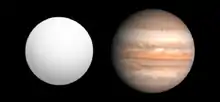SWEEPS-04
SWEEPS-04 is an extrasolar planet orbiting the star SWEEPS J175853.92−291120.6 in the constellation Sagittarius approximately 27,710 light years away (based on a distance modulus of 14.1) from the Solar System, making it (along with SWEEPS-11) the most distant exoplanet(s) known.[2] This planet was found in 2006 by the Sagittarius Window Eclipsing Extrasolar Planet Search (SWEEPS) program that uses the transit method.
 Size comparison of SWEEPS-04 with Jupiter. | |
| Discovery | |
|---|---|
| Discovered by | Sahu et al.[1] |
| Discovery date | October 4, 2006 |
| Transit | |
| Orbital characteristics | |
| 0.055 AU (8,200,000 km) | |
| 4.2 d | |
| Inclination | >87 |
| Star | SWEEPS J175853.92−291120.6 |
| Physical characteristics | |
Mean radius | 0.81±0.1 RJ |
| Mass | <3.8 MJ |
The upper limit on the planet's mass is 3.8 times the mass of Jupiter. The best fit radius is 0.81 times that of Jupiter, but the uncertainty in this value is large, around 12%. It orbits at an average distance of 8,200,000 km (0.055 AU) from the parent star, taking 4.2 days to revolve around it.
 HST SWEEPS-4 2006
HST SWEEPS-4 2006.jpg.webp) Radial Velocities of SWEEPS-04 (UVES-VLT)
Radial Velocities of SWEEPS-04 (UVES-VLT) Artist's impression of a transiting Jupiter-mass exoplanet SWEEPS J175853.92-291120.6 b
Artist's impression of a transiting Jupiter-mass exoplanet SWEEPS J175853.92-291120.6 b
See also
References
- Sahu, Kailash C.; Casertano, S; Bond, HE; Valenti, J; Smith, TE; Minniti, D; Zoccali, M; Livio, M; et al. (2006). "Transiting extrasolar planetary candidates in the Galactic bulge". Nature. 443 (7111): 534–540. arXiv:astro-ph/0610098. Bibcode:2006Natur.443..534S. doi:10.1038/nature05158. PMID 17024085. S2CID 4403395. (web Preprint)
- "HEC: Top 10 Exoplanets - Planetary Habitability Laboratory @ UPR Arecibo". phl.upr.edu. Archived from the original on 17 December 2013. Retrieved 16 July 2018.
External links
- "SWEEPS-04". Exoplanets. Archived from the original on 2009-11-25. Retrieved 2009-05-22.
This article is issued from Wikipedia. The text is licensed under Creative Commons - Attribution - Sharealike. Additional terms may apply for the media files.